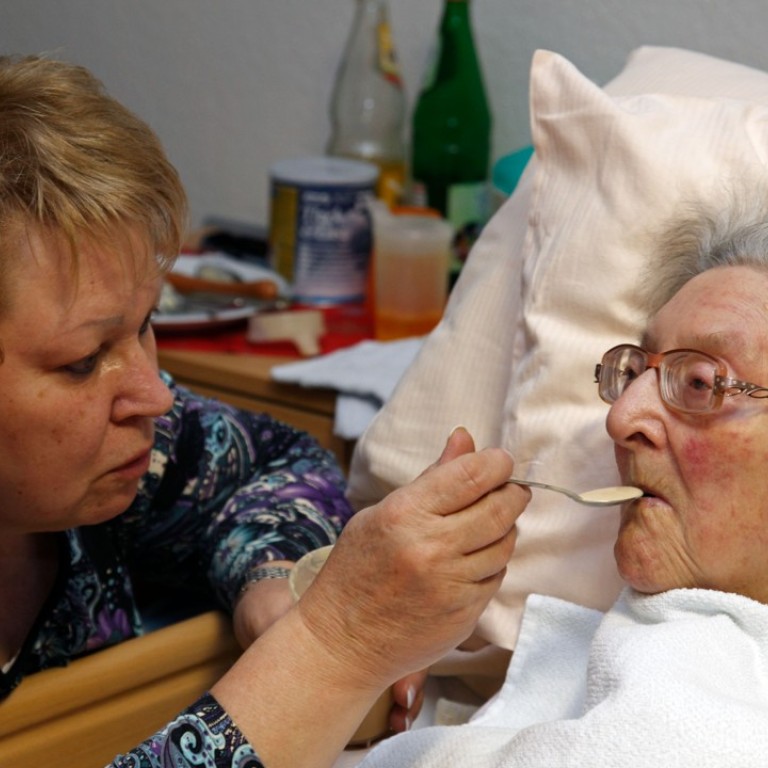
How dementia is caused by mini strokes, how to detect it early and nine ways to reduce your risk
Experts believe vascular dementia can be prevented by living a heart-healthy lifestyle. We look at the warning signs, symptoms and causes of this increasingly common brain disease and ways to stave it off
Many of us experience mental lapses as we age – keys left at home; names of familiar faces forgotten. Some signs should not be readily dismissed, as they could point to serious mental deterioration associated with brain ageing.
For many, dementia springs to mind. Although it is named as the eighth most common cause of death in Hong Kong, there are no exact figures.
The most common from of dementia is Alzheimer’s, followed by vascular dementia, another neurodegenerative disease.

Why it’s not inevitable your memory will fade as you get older, and how to stave off dementia
“When we talk about keeping brain healthy as you age, it’s not just about preventing Alzheimer’s, but also about preventing big strokes and very small strokes,” says Rosand.
The frightening reality of a mini-stroke, or transient ischemic attack (a brief episode of impaired blood flow to the brain) is that they often go untreated until there have been enough attacks to cause symptoms leading to a visit to a doctor.
Memory loss is seen in many types of dementia, but the symptoms of vascular dementia include difficulty in executing tasks, communication problems such as slurred speech, and judgment and impulse issues.

“We all forget names and words, but when that starts to interfere with someone’s ability to communicate, when conversations come to a halt as they cannot find the words suddenly, or the wrong word was used … and that person does not notice, those are warning signs,” says Rosand. Social withdrawal is another symptom that should be looked into.
Hong Kong urged to conduct local research into dementia
The good news is that lifestyle changes can help prevent this disorder.
Dr Eric Chan, a Hong Kong Neurological Society council member, says not enough is being done to raise awareness of the prevention of vascular dementia.
“At public hospitals, doctors don’t have time to talk to patients about brain health most of the time, until they have a stroke,” he says.
“We see a lot of patients in their 70s and 80s with a combination of dementia, such as Alzheimer’s plus vascular dementia,” he says. The combination of disorders increases patients’ cognitive decline.
Wearable brain scanner could revolutionise neural care for children and elderly
“Both are related to vascular risk, such as hypertension, diabetes, high cholesterol and smoking,” Chan says, adding that if you can control these factors, you have a better chance of preventing the disease.
Rosand commonly deals with people with a family history of strokes who expect to face the same fate. He cites research, including a 2016 study of coronary disease led by Amit Khera that was published in the New England Journal of Medicine.

“If you have inherited genes that increase your risk of having a stroke, treat it as a call to action,” Rosand says.
Top 10 killer diseases in Hong Kong claim 18pc more lives than a decade ago
Neurologists say there is a clear need for public education and awareness of ways to prevent brain diseases. For Rosand, this ethos underpinned the opening of the Henry and Allison McCance Centre for Brain Health at Massachusetts General Hospital in 2016.
“We’ve taken the approach of discovering why certain genes increase your risk of stroke in the hope that it will allow us to discover new drugs to prevent stroke,” he explains. The centre will establish a partner arm at the Chinese University of Hong Kong to collaborate and conduct research in this area. The Hong Kong centre will also feature a clinic to treat patients.

Nine ways to ensure healthy brain ageing
Lifestyle improvements can have an enormous impact on brain health. Here are nine ways you can protect your grey matter.
1. Get high blood pressure under control
2. Cut back on alcohol and caffeine
3. Quit smoking
4. Be physically ac tive
Rosand encourages moderate to vigorous exercise that gets the heart rate up, such as cycling or jogging, for 30 minutes daily.
5. Rethink your diet
Especially if you have high cholesterol. “A poor quality diet is a risk factor for heart disease and stroke,” says Rosand. Avoid foods that are processed, and high in fat and salt. Eat more fruits, vegetables and fibre. If you have diabetes, get your blood sugar level under control.
6. Destress
“Chronic stress, probably through what we call inflammation, is associated with a higher risk of a whole range of diseases including stroke and probably Alzheimer’s,” Rosand says, adding that meditation is a great way to reduce anxiety. “We have an active meditation group in our hospital to help patients find a meditation practice that works for them.”
7. Acquire new skills
This could be learning to play a musical instrument, studying a new language, or engaging in “brain workouts” such as Sudoku puzzles. “We know that people who pursue education seem to have a lower risk of developing Alzheimer’s disease, so it seems reasonable to encourage patients to learn new things,” says Rosand.
Consider volunteering for community groups or getting involved in new projects, as MRI-based studies show the brain reorganises during the learning process. Forming new connections in the brain through learning encourages its “plasticity”.
8. Engage socially more often
A rich web of friends stimulates the brain and prevents stroke and dementia. One theory based on preliminary studies suggests elevated levels of beneficial chemicals in the blood, known as brain- derived neurotrophic factors (BDNF), result from such relationships.
Rosand says the science behind BDNF is not fully understood and more research is required. Chan agrees that making good friends as one gets older is a good idea, as “many social activities can help with brain health”.
9. Get enough sleep
Chan notes that sleep is vital for memory. “If you don’t get enough sleep, particularly deep sleep, the brain doesn’t get a chance to remove waste that accumulates [during the day]; in the long term, this contributes to dementia.”

